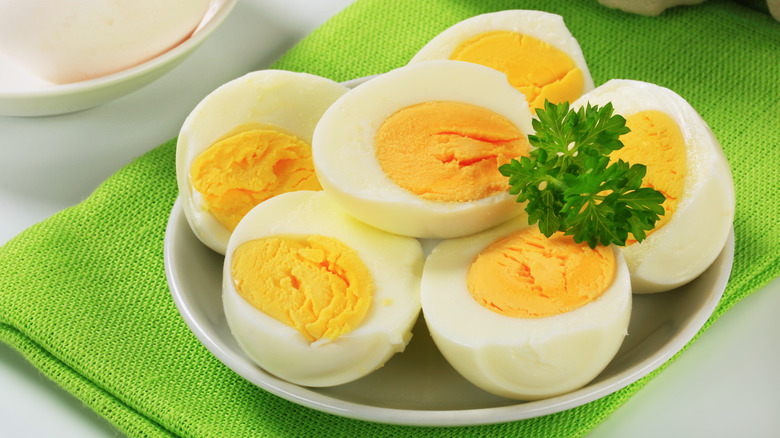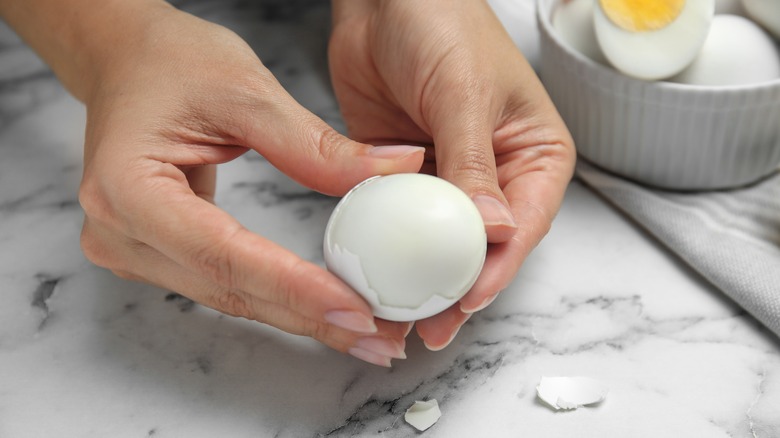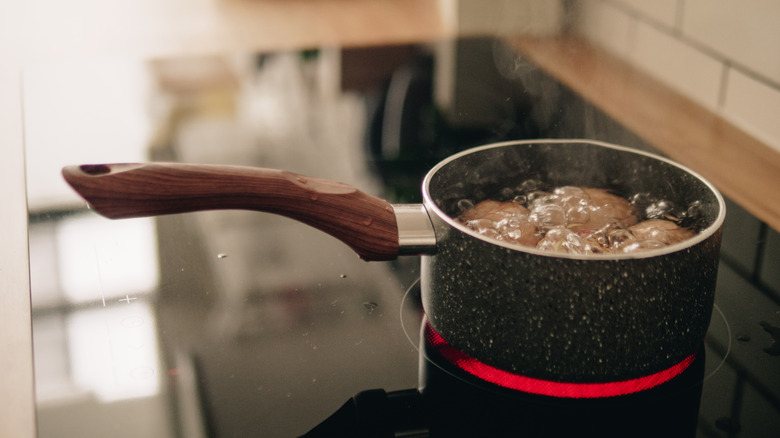The Unexpected Boiling Hack For Easy-Peel Hard-Boiled Eggs
For all the nutrition and convenience afforded by hard-boiled eggs, peeling them can often be quite challenging. Fortunately, adding lemon juice or another type of acid to the cooking process prevents shells from cracking and ensures easier peeling once everything is said and done. However, it also helps to understand why certain eggs are more difficult to peel.
Albumen, more commonly known as egg white, contains a protein called keratin, which is also found in your skin, hair, and fingernails. This keratin will form a tighter bond with the egg white in some situations, such as when an egg is fresh, as the albumen in fresh eggs has higher levels of carbon dioxide. As carbon dioxide slowly seeps from the pores of the eggshell over time, the bonds between the keratin and egg white become looser, making the egg-peeling process far easier. That means older eggs are easier to peel in general, especially when you employ the helpful acid technique when boiling.
Variations on the lemon juice hard-boiled egg hack
There are a few different ways to prep hard-boiled eggs for easy peeling. The first entails brushing the shells of an uncooked egg with lemon juice before boiling, which helps keep the shell in one piece as the egg is being cooked. You can also add lemon juice directly to the water you're using to boil the egg, which helps with the peeling process. In this case, add about a teaspoon of lemon juice to ensure convenience without drastically altering the flavor of this protein-rich snack. Keep in mind that you can also substitute vinegar for lemon juice, as vinegar's acidity will have the same effect on eggshells.
According to Toronto Star, some chefs also suggest adding a lemon wedge to the water and leaving it submerged while boiling the egg. However, this method may not be as effective and could potentially result in uneven peeling. Along with what you add to the water, how you cook the eggs also impacts the ease of peeling.
Other cooking tips for hard-boiled eggs
Timing is a crucial component when it comes to a perfectly peel-able hard-boiled egg. To this end, you should never add eggs to cold water before bringing it to a boil, unless you enjoy struggling with the egg-peeling process. Instead, fill the pot with water and allow it to start boiling before you add the eggs. After adding the eggs, reduce the heat on the stovetop to allow your eggs to simmer gently. Total cooking time should be about 10 to 13 minutes. You can determine doneness by spinning a boiled egg on a flat surface. If the egg doesn't wobble, it's most likely done.
After boiling, transfer eggs to an ice bath. Allow them to soak for approximately five minutes, then remove the eggs from the water. You can also break the bonds between the shell and egg white by tapping the finished eggs against your countertop, making sure to tap each part of the egg for the best results. You're now ready to easily peel and eat your delicious, hard-boiled egg.


